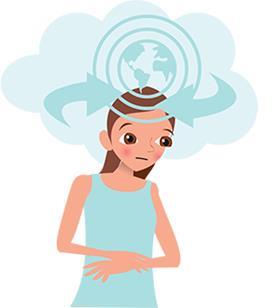Lindsay Clandfield and Duncan Foord highlight common signs of culture shock and give us tried and tested tips on how to deal with it.
Feeling like a fish out of water

Surprise, nervousness, anxiety, disorientation, paranoia … These are all words teachers have used to describe their feelings in a new situation. This could be with a new class, a new level, a new school, a new city or a new country they are working in. Relax! These feelings are completely normal. They are part of what is known as culture shock.
Are you now, or have you ever been, either of the teachers below?
Teacher A: You have your teaching certificate. You have your plane ticket to a new country where you know that you have your first job waiting for you. It is your first time abroad. Your parents are worried, your friends are terribly jealous. You feel excited and ready for the new challenge …
Teacher B: You are an English teacher. You have your plane ticket to Britain or the United States where you are going to do a summer teaching course. It is your first time abroad. Your colleagues are terribly jealous. You feel excited and ready for the new challenge …
If the answer is yes, then there is a good chance that you have experienced (or will experience) culture shock to some degree. In these pages we take a look at the experience of culture shock.
Culture shock questionnaire
How prone are you to culture shock? Do this quick test to find out. Read each of the sentences. If the sentence is true for you, write down the number and a tick next to it. If the sentence is false for you, write down the number with a cross next to it.
- I have experienced many changes in my lifetime.
- I have had to move house and / or change jobs several times.
- I have travelled to many different countries.
- I have experienced a completely different culture to my own.
- I have lived in a different country.
- I am open to new ideas and different ways of life.
- I know what culture shock is.
- I am aware of the different stages of culture shock.
- I would go and live in another country even if I didn’t speak the native language.
- If I were to live in another country, I wouldn’t reject my own culture.
Count your ticks and crosses. If you have six or more ticks, there is a good chance that you wouldn’t experience culture shock too seriously if you went to live in another country. If you have fewer than six ticks, you are somebody who, according to research, is prone to culture shock.
Culture shock defined
For the past 40 years, European and American psychologists and anthropologists have been researching culture shock. They have studied the reactions and experiences during the first few months in a new country of travellers and diplomats, business people and international students. Research has shown that what most of these people have in common is a series of reactions to the new culture. Culture shock can affect people to different degrees, but there is a predictable sequence of stages that everyone seems to undergo.

Stage 1: The honeymoon (or tourist) stage
In this stage, everything is exciting and new. People tend to idealize the new culture. Occasional frustrations and anxiety are interpreted positively and nothing is seen in a bad light.
Stage 2: Shock
In this stage, all the little problems and frustrations take on much bigger proportions. People often become preoccupied with cleanliness (Everything is so dirty here!); they feel like outsiders, confused and lonely. Becoming paranoid about being robbed or cheated and fearing for one’s safety are also typical reactions. If the shock is too great, the traveller may go home.
Stage 3: The adjustment stage
Many people may not get to this stage if the shock in stage two was too great. In that case, they will have gone back home. But if they do decide to stay, they eventually learn to deal with the differences as they arise. People try to integrate the new culture with their own beliefs. The occasional crisis will still occur, but the newcomers will develop a positive attitude towards it. Adjustment can be slow, but it’s worth it to get to stage four.
Stage 4: Acceptance or acculturation
This is the final stage, where people can live well within the new culture. Although it is difficult to be completely assimilated, people go through significant personal changes and growth as they become integrated into the new culture. They develop a bicultural identity.
Re-entry shock
This is the shock of coming back home. Some participants returning from extended international study find no one willing to relive those fascinating, cultural memories. Family and friends are waiting to greet you with open arms, but not always with open eyes. Facing the unbelievable ’newness’ of home and the unwillingness of friends to listen leaves returning participants feeling more like strangers in their own country. According to Judith Martin, an associate professor of intercultural communication at the University of Minnesota, it is more difficult to come home. When you go abroad, she says, “you expect it to be different; when you come home, no one expects you to have changed”.
Relevance to ELT
There are two reasons that make culture shock important for ELT.
1. With increased immigration in many classrooms becoming a hot topic around the world, many students in English classrooms may be new arrivals themselves. They could be going through any one
of these stages.
2. Many native ELT teachers begin their teaching career in a foreign country with little training and are ill-prepared for the culture shock they might undergo. If we were worried about the students in our classrooms undergoing shock, then what about the teacher? However, culture shock could equally occur with teachers going for an extended stay in Britain or the USA.
Dealing with culture shock

Here are eight tips on how to deal with culture shock, taken from various experts in the field and our own experience living in other cultures.
1. Become aware of the stages of culture shock. Reading this article alone is a good step!
2. Keep in touch with family and friends back home. With all the social media tools now at your disposal this is easier than ever. It may be worth still asking some friends or family members to keep in touch with you by sending the occasional paper letter or postcard. This will feel much more tangible and real than a quick Facebook comment.
3. Try to make new friends in the host culture. Take up a hobby or join a gym; take an evening class. One of the authors of this article took dancing classes in Guatemala, which helped.
4. Accept the feelings of sadness and loss, and don’t try to repress them.
5. Have a sense of humour about things. Lighten up and remember that in many cases things might not be better or worse, just different.
6. Keep your judgments about the new culture to a minimum and try to be as flexible as possible.
7. Learn the local language! Take classes, do language exchanges, try to speak as much as you can with others. Practise what you preach!
8. Talk with fellow nationals about their experience with this process, but be careful not to get into a collective moan. This can happen, especially when groups of expat teachers form their own ’ghettos’. Try not to lean on others too heavily. Be independent.
Downloads
Click link to download and view these filesSurvival Guide: Culture shock: Article
PDF, Size 0.78 mb
Credits
- Brislin, Richard W. Cross-Cultural Encounters: Face-to-Face Interaction. Pergamon Press, 1981.
- Kohls, L. Robert. Survival Kit for Overseas Living. Intercultural Press, 1984.
- Lewis, Tom and Jungman, Robert. On Being Foreign: Culture Shock in Short Fiction, An International Anthology. Intercultural Press, 1986.
- Oberg, Kalervo. Culture Shock: Adjustment to New Environments. Practical Anthropology 7: 177-82, 1960.
Introduction to Survival Guide

We’re Lindsay Clandfield and Duncan Foord; two language teachers, teacher trainers and writers based in Spain. With more than forty years’ experience between us, we also consider ourselves survivors.
- 1
- 2
- 3
- 4
- 5
- 6
- 7
- 8
- 9
- 10
- 11
- 12
- 13
- Currently reading
Survival Guide: Culture shock
- 15
- 16
- 17
- 18
- 19













No comments yet